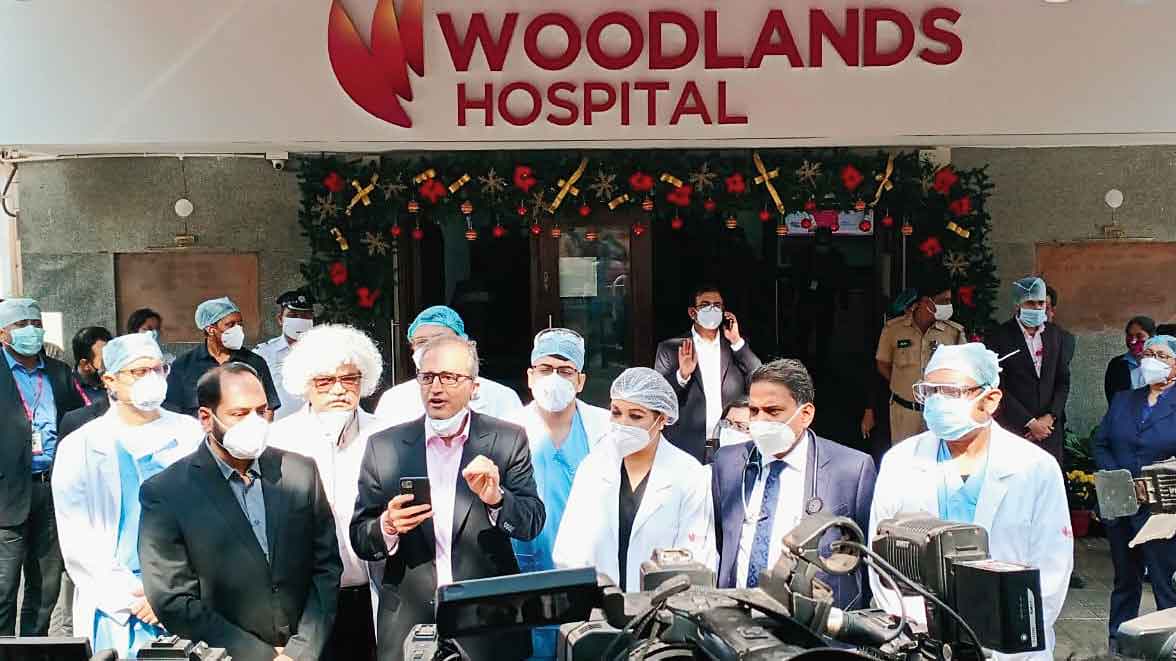Sourav Ganguly can run a marathon or fly a plane and his heart will not be a hindrance to normal life, cardiac surgeon Devi Shetty said on Tuesday after meeting the former India cricket captain at Woodlands Hospital.
“Will this event (heart attack) have an impact on his life? Certainly not. Sourav has received the right care. He is going to lead a normal life like anybody else. This event should not affect his lifestyle or lifespan,” said Shetty, the chairman and founder of Narayana Health, who flew down from Bangalore on Tuesday to examine Sourav. He also pointed out the importance of regular health check-ups, even for young and healthy individuals, to prevent such events.
Sourav, 48, had suffered the heart attack while working out on a treadmill at home and underwent angioplasty to get a stent implanted in his right coronary artery.
There are blockages in two other coronary arteries, which will be dealt with after 15 days, said doctors and officials at Woodlands. Sourav is set to be discharged on Wednesday.
“After this procedure, Sourav can participate in a marathon race. He can fly a plane,” said Shetty. He said that even if someone underwent a bypass surgery, which is a lot more intensive than an angioplasty, one could get a licence to fly a civilian plane.
“Sourav can chase any of his dreams and aspirations…. He can get back to cricket if he wants to and he can exercise like a normal person,” said Shetty.
The nine-member medical board at Woodlands had taken opinions of several doctors in India and abroad, including Shetty, on Monday about the course of Sourav’s treatment.
“The consensus opinion among doctors is that he can get back home and start working…. At some point of time he may require angioplasty, which is like a routine procedure done in most hospitals of the country. It is nothing very complicated or life threatening,” said Shetty.
Asked why the second round of stent implantation cannot be done immediately, Shetty said it might lead to formation of small blood clots in the artery.
“When someone develops a blood clot in the coronary artery, the entire body chemistry changes. He is more likely to develop a fresh clot if we insert a foreign body. That is why we want to defer it,” he said.
Shetty pointed out the importance of regular health check-ups to reduce chances of a heart attack.
“People think how can a 48-year-old athletic man like Sourav, who doesn’t drink or smoke and is a fit man, have a heart attack? This is the true reality of India. The kind of lifestyle we lead, irrespective of how athletic you are, you can still have a heart attack if you don’t go for a preventive check-up at regular intervals,” Shetty said.
“If Sourav had undergone a simple test like CT angiogram, this incident could have been predicted.”
The Telegraph report on Tuesday, which quoted a number of doctors, highlighted the need for regular health check-ups.
“It doesn’t matter how fit you are, you should go for a regular health check-up once a year or once in two years…. This is the message Sourav wanted to give to all,” said Shetty.
Explaining the importance of exercise and leading a healthy lifestyle, the cardiac surgeon said apparently it would seem there was no use of such things.
“One may ask what is the point of leading a life like Sourav. He exercised all his life, didn’t drink or smoke but still had a heart attack. Sourav had blockages in tiny isolated portions of the coronary arteries,” he said.
Coronary arteries are long pipes and most people who lead an unhealthy lifestyle can develop a blockage along the entire length of such an artery. “Sourav had tiny areas of critical blockage and once it’s dealt with, his heart is going to be as healthy as anybody else’s,” he said.
According to Shetty, no one can predict such an incident. “Even in the life of a monk… something changes in the body and then one can form a blood clot anywhere in the body. It stays for a short period of time and disappears,” he said.
“My advice is, it doesn’t matter how strong or fit you are or how fast you run, get a preventive health check-up done at least once in two years. You can predict your heart attack 20 years ahead,” said Shetty.










